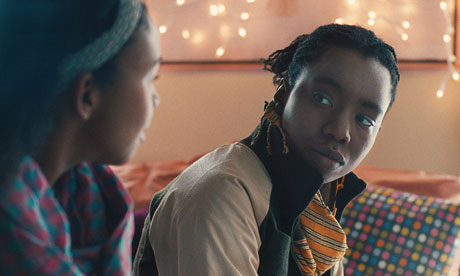
Octavia Spencer won a Golden Globe for best supporting actress for her role in the hit film The Help, and I couldn't be more conflicted. Spencer is a talented veteran actress deserving of many accolades – but how I wish it were for another film. The Golden Globes are a strong predictor for the Oscars, and The Help will surely mirror its Globes success there, likely garnering nominations for best picture, best supporting actress for Spencer, and best actress for Viola Davis. It will further validate, for some, the portrayal of black life seen in this movie.
Meanwhile, the Oscar buzz for Pariah, the magnificent coming-of-age story about a young black lesbian in Brooklyn, fails to rise about a muzzled hum. And this despite a namecheck from Meryl Streep as she collected her Golden Globe for The Iron Lady.
I hesitate to pit these two films against one another, but this is the position we're in. Hollywood forces us to choose by only handing out quality roles to a few black actors every other year, and then rewarding the least interesting and most divisive among them. The Help squanders an opportunity to provide a vital and revelatory look into the lives of black domestic workers in the throes of the civil rights movement; instead it sanitises their story, glosses over the realities of systemic racism, the effects of poverty, exalts the "white saviour" motif, and traffics in tired "mammy" stereotypes. Yet it has still become a white liberal favourite.
In an industry where 2005's best picture winner Crash passes for progressive racial politics, it's no wonder why the keepers of the key have an issue recognising the twisted portrayals of people of colour and their stories. It passes on nearly every opportunity it has to award authentic, complicated, three-dimensional black characters and films.
Over the years, the Academy could have easily honoured Charles Burnett's Killer of Sheep, Julie Dash's Daughters of the Dust, Tanya Hamilton's Night Catches Us, or even Spike Lee's Do the Right Thing and Malcolm X. The Color Purple received 11 nominations, and struck out in every category. Just one win for any of these films would have dulled the sting that comes along with witnessing the Oscars celebrate black dysfunction in the form of Precious. But they've consistently failed.
It's worse when you start factoring in gender. The margin is slim, but black men have fared better with the Academy than black women. Black women have captured attention and wide critical acclaim by fulfilling only the basest of stereotypes. Viola Davis is one of the finest actresses working today. Her performance in The Help is truly remarkable. But what does it mean that in 2012 the best role available to her, according the standards set by the industry, is no different than what would have been available in 1939? What does it mean that Halle Berry became the first black woman to win best actress by embodying the lascivious jezebel? What does it mean when Mo'Nique's big win comes for portraying what amounts to an angry black welfare queen? These aren't the outliers. Black women don't have the luxury of a large number of nominations or wins for there to be any outliers. They aren't exceptions, rather they are the rule. There has been no progression.
Pariah presents Hollywood with an opportunity to actually live up to its liberal reputation. The characters represent a rich tapestry of black womanhood not often explored in film. Adepero Oduye gives a brilliant performance as the protagonist Alike, a teenage girl searching for her identity and place in the world which rejects and despises her sexual orientation. Her mother is played by Kim Wayans, of the famous Wayans clan, who delivers a moving performance, creating a sympathetic character where you wouldn't expect one. And director Dee Rees ties it together beautifully in her debut, letting the story breathe on its own.
Any of them would be worthy of an Oscar. They may not win, but a few nominations for Pariah would be a sign that Hollywood is at least trying to challenge their myopic view of black people and black art.

